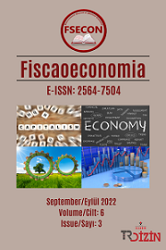Uluslararası Ticaretin Kurumsal Tarihi: Gelişmekte Olan Ülkeler Üzerinden Bir İnceleme
The Institutional History of International Trade: A Study on Developing Countries
Author(s): Ziya CanSubject(s): Economic history, International relations/trade, Economic development, Globalization
Published by: Ahmet Arif Eren
Keywords: Developing Countries; Globalization; Free Trade; International Economic Organizations;
Summary/Abstract: While trade is regarded by some as the basis of the economy, for others, it considered the cause of everything good and bad in the world, even beyond the economy. Human history is fraught with wars, the main reason for gaining an advantage in trade. Theories that emerged to evaluate the advantages to be gained from trade have an important place in the field of economics. After the classical approach, international trade theories in economic literature have constantly been developed through dualities. The advantage arising between the parties of foreign trade originates from the differences in factor endowments for some theories, technological development according to some others, and capital accumulation for others. Nevertheless, the majority of these theories do not include the driving forces of the differences. Only a few theories have suggested that these differences bear the traces of the colonial period. Yet, the de facto end of colonialism and the spread of financial liberalization and international capital movements are the major developments in the field of the economy during the second half of the 20th century. By all means, it is no coincidence that these developments took place simultaneously. This study aims to examine the history of international trade through international organizations that play a dominant role in the preservation of the bilateral structure based on capital ownership, in order to fill the gap for the aforementioned deficiency. The institutions to be discussed will be examined according to the functions of the global system established after the wars that ended the age of empires in protecting the historical positions of the capital-owning countries, and it will be discussed to what extent the organizations fulfill these functions. In the conclusion part, the current state of the global system will be examined and the possibility of developing countries to change their current positions will be dwelled on.
Journal: Fiscaoeconomia
- Issue Year: 6/2022
- Issue No: 3
- Page Range: 1233-1265
- Page Count: 33
- Language: Turkish

